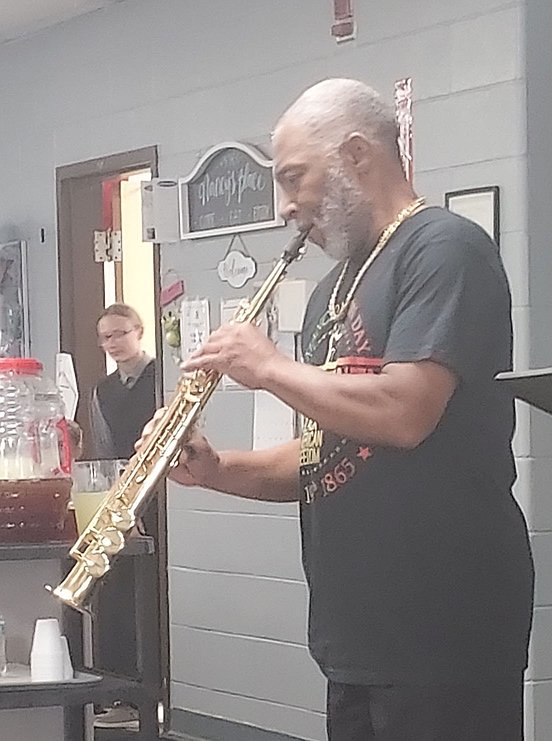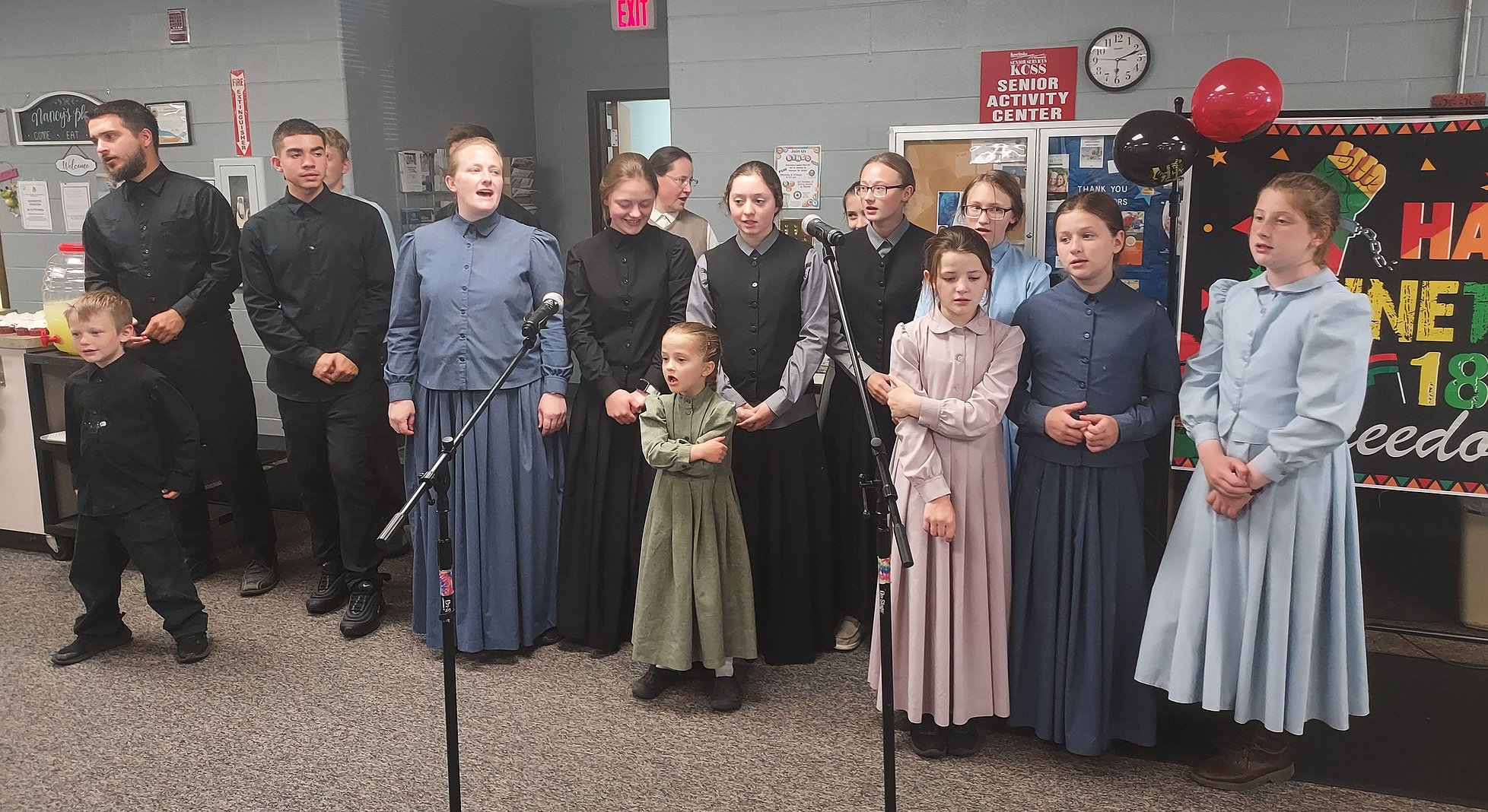Juneteenth Brings History And Community Together
June 23, 2024 at 4:40 p.m.

Juneteenth commemorates the end of slavery on June 19, 1865, in the U.S.
As part of the Juneteenth celebration Saturday at the Warsaw Community Senior Center, 800 N. Park Ave., Warsaw, Jaylyn Radziminski, founder and CEO of Count US IN, talked about the history of Juneteenth and Black voting rights.
She said Juneteenth is about freedom, liberation and celebration. It is also about contemplation and reflection on “how to improve our condition systemically for us today and for generations to come.”
She quoted activist Fannie Lou Hamer who said no one is free until everyone is free.
On June 19, 1865, federal troops in Galveston, Texas, “came to ensure all enslaved people were freed.” This was two and a half years after President Abraham Lincoln signed the Emancipation Proclamation, she said.
Juneteenth honors the national end of slavery in the United States. It was made a federal holiday in 2021.
Radziminski said the fight for African-Americans’ rights and freedoms didn’t end on Juneteenth. Some scholars show some black communities were indebted and forced to work on plantations well into the 1960s.
Juneteenth was the day slavery was federally abolished. There was reconstruction period to integrate “our two communities post-slavery,” she said.
Civil Rights Act of 1866 gave citizens of every race and color equal rights to make contracts, testify in court, purchase, hold and dispose of property and enjoy full and equal benefit of all laws. The 15th Amendment gave Black men the right to vote. After that, thousands of Black people were elected to office during that era.
There were often surges of violence on election days and states started passing the literacy test to suppress votes, Radziminski said.
Despite that, there was a period of growth known as the Harlem Renaissance, she said.
Even after the 19th Amendment was passed, it would be years before Black people would see their dreams of voting come true, Radziminski said. The literary test and hostilities continued to grow. There was also a lot of race-based violence, including the burning of Black Wall Street. It made it harder for Black people to vote.
It was Black disabled activists like Hamer and the Voting Right Act of the 1960s that helped “our communities and Black people in general have the right to vote,” she said.
Radziminski said there is still a lot to be done.
“In Indiana and around the world, we’re gathering to prevent the harmful policies and laws that are still trying to take our right to vote away,” she said. “Our community is still facing those barriers,” as well as overpolicing, food deserts and barriers to education.
Queenetta Young said she is originally from Chicago. She said that area has rich history and food, culture, music and diversity.
As an African American, “we use celebration as just a joyful event, something we use as a tool to be lifted and so thankful because we’ve been through so much.”
Young said growing up in Chicago, she remembers her grandmother having a garden in her backyard and having block parties and the fire department opening up fire hydrants and playing in the water.
“For me, my roots come from being in the church,” she said. “Growing up there, I had a sense of belonging. Not just in the church, but in the community.”
Where she came from there were cookouts, community cleanups, door-to-door gospel sharing and school events. Growing up, she remembers hosting families from other countries and hearing about missions in other countries and being part of a diverse melting pot.
She also remembers Watch Night service. On Dec. 31, there would be a Watch Night service at the church. As soon as it turned midnight, they would sing and dance and celebrate the new year.
While a generational thing, it is rooted in African-American religious tradition, she said. During the first Watch Night, many of the enslaved African-Americans gathered to pray, worship, sing and dance. The occasion known as Watch Night was also known as Freedom Eve, “so that’s where we come up with Juneteenth.” It marks slaves as watched and waited for news of freedom.
Today, Watch Night service is an annual New Year’s Eve tradition about the memory of slavery and freedom, reflection on faith and strength in community, Young said.
Her community is embraced in love and acceptance and Young said that was beauty to her.
When Young moved to Warsaw 17 years ago, it was a huge culture shock and, initially, she felt there was nothing here for her. She had to create a community for herself.
“Being here in this community has helped me understand why it is so important to be proud of who I am,” Young said. She has been through a lot in the 17 years she’s been in Warsaw. She had to understand not everyone thinks like her. As a woman, she said she is finally feeling a purpose to remain in Warsaw for a while.
She was able to gain a community and said community is important. Community will continue to ensure diversity and equality has a voice.
Also during the Juneteenth celebration, the youth choir from the Church of God sang and musician Charles Cotton performed.
David Neff, executive director of Kosciusko County Senior Services, was presented a check for $325 from Count Us IN to help with expenses at the Senior Center.
Neff said the money will go towards at least 100 senior meals in Kosciusko County.
Juneteenth commemorates the end of slavery on June 19, 1865, in the U.S.
As part of the Juneteenth celebration Saturday at the Warsaw Community Senior Center, 800 N. Park Ave., Warsaw, Jaylyn Radziminski, founder and CEO of Count US IN, talked about the history of Juneteenth and Black voting rights.
She said Juneteenth is about freedom, liberation and celebration. It is also about contemplation and reflection on “how to improve our condition systemically for us today and for generations to come.”
She quoted activist Fannie Lou Hamer who said no one is free until everyone is free.
On June 19, 1865, federal troops in Galveston, Texas, “came to ensure all enslaved people were freed.” This was two and a half years after President Abraham Lincoln signed the Emancipation Proclamation, she said.
Juneteenth honors the national end of slavery in the United States. It was made a federal holiday in 2021.
Radziminski said the fight for African-Americans’ rights and freedoms didn’t end on Juneteenth. Some scholars show some black communities were indebted and forced to work on plantations well into the 1960s.
Juneteenth was the day slavery was federally abolished. There was reconstruction period to integrate “our two communities post-slavery,” she said.
Civil Rights Act of 1866 gave citizens of every race and color equal rights to make contracts, testify in court, purchase, hold and dispose of property and enjoy full and equal benefit of all laws. The 15th Amendment gave Black men the right to vote. After that, thousands of Black people were elected to office during that era.
There were often surges of violence on election days and states started passing the literacy test to suppress votes, Radziminski said.
Despite that, there was a period of growth known as the Harlem Renaissance, she said.
Even after the 19th Amendment was passed, it would be years before Black people would see their dreams of voting come true, Radziminski said. The literary test and hostilities continued to grow. There was also a lot of race-based violence, including the burning of Black Wall Street. It made it harder for Black people to vote.
It was Black disabled activists like Hamer and the Voting Right Act of the 1960s that helped “our communities and Black people in general have the right to vote,” she said.
Radziminski said there is still a lot to be done.
“In Indiana and around the world, we’re gathering to prevent the harmful policies and laws that are still trying to take our right to vote away,” she said. “Our community is still facing those barriers,” as well as overpolicing, food deserts and barriers to education.
Queenetta Young said she is originally from Chicago. She said that area has rich history and food, culture, music and diversity.
As an African American, “we use celebration as just a joyful event, something we use as a tool to be lifted and so thankful because we’ve been through so much.”
Young said growing up in Chicago, she remembers her grandmother having a garden in her backyard and having block parties and the fire department opening up fire hydrants and playing in the water.
“For me, my roots come from being in the church,” she said. “Growing up there, I had a sense of belonging. Not just in the church, but in the community.”
Where she came from there were cookouts, community cleanups, door-to-door gospel sharing and school events. Growing up, she remembers hosting families from other countries and hearing about missions in other countries and being part of a diverse melting pot.
She also remembers Watch Night service. On Dec. 31, there would be a Watch Night service at the church. As soon as it turned midnight, they would sing and dance and celebrate the new year.
While a generational thing, it is rooted in African-American religious tradition, she said. During the first Watch Night, many of the enslaved African-Americans gathered to pray, worship, sing and dance. The occasion known as Watch Night was also known as Freedom Eve, “so that’s where we come up with Juneteenth.” It marks slaves as watched and waited for news of freedom.
Today, Watch Night service is an annual New Year’s Eve tradition about the memory of slavery and freedom, reflection on faith and strength in community, Young said.
Her community is embraced in love and acceptance and Young said that was beauty to her.
When Young moved to Warsaw 17 years ago, it was a huge culture shock and, initially, she felt there was nothing here for her. She had to create a community for herself.
“Being here in this community has helped me understand why it is so important to be proud of who I am,” Young said. She has been through a lot in the 17 years she’s been in Warsaw. She had to understand not everyone thinks like her. As a woman, she said she is finally feeling a purpose to remain in Warsaw for a while.
She was able to gain a community and said community is important. Community will continue to ensure diversity and equality has a voice.
Also during the Juneteenth celebration, the youth choir from the Church of God sang and musician Charles Cotton performed.
David Neff, executive director of Kosciusko County Senior Services, was presented a check for $325 from Count Us IN to help with expenses at the Senior Center.
Neff said the money will go towards at least 100 senior meals in Kosciusko County.



